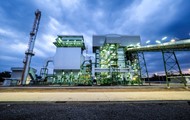 Net Zero Cheshire
Net Zero Cheshire
Once a building has been made more thermally efficient, there are a number of technologies that can decarbonise a building’s heating supply further.
If a building has an old electric heating system such as storage heaters or electric radiators, these systems are inefficient, making them some of the most expensive and highest carbon dioxide (CO2) emitting used in the UK. Changing from these heating systems to a low carbon system is highly recommended (1). Greenhouse gas emissions associated with power generation have been decreasing in recent years, mainly due to renewables replacing fossil fuel generation. Nevertheless, grid electricity remains relatively carbon intensive, after all, this is the main reason why Renewable Electricity Generation & Storage is so beneficial. This means using grid electricity for direct heating applications is not favourable from an emissions reduction point of view.
Even though Heat Pumps are electrically powered they do not work on the same operating principals as storage heaters or electric radiators. They use electricity to pump and compress fluids, rather than for direct heating. As a result, heat pumps are good candidates to be coupled with Renewable Electricity Generation & Storage.
The UK Government plans to phase out oil and LPG (liquid petroleum gas) boilers in favour of a lower carbon alternative during this decade (2). If a building is not on the gas grid there are a number of low carbon heating technologies available such as Biomass heating and Heat Pumps. Even if the building is on the gas grid these low carbon technologies may be worth considering, not only from a carbon abatement point of view but also from a financial perspective.
That said, it is recognised that there may be some buildings where new heating systems are not yet practical or affordable. Here, upgrades to the current heating system such as replacing an old, inefficient gas boiler with a new, high efficiency condensing one are the best available way forward. An example of such a building might be one in a dense urban area, with insufficient space to store biomass fuel or install a heat pump.
In the future, the UK Government suggests that instead of natural gas, some buildings may be supplied with hydrogen through the current gas network. This is as hydrogen can be produced with electricity generated from renewable sources, and due to its chemistry hydrogen burns without emitting any carbon dioxide (CO2). However, hydrogen burns with a higher temperature flame, which causes emissions of nitrogen oxides (NOx). These are pollutants in themselves, and form greenhouse gases other than CO2 in the atmosphere: Nitrous oxide (N2O) and ozone (O3). (3)
The UK natural gas industry is preparing for a transition to hydrogen. 'Hydrogen-ready' boiler technology which can burn natural gas or a mixture of both natural gas and hydrogen are at a high level of readiness, ahead of a transition to hydrogen only boilers, which require different burners. NOx emissions can be minimised with lower temperature flames, so work is underway on burners that yield lower temperature diffuse flames. (4)
Thus, this section will first discuss upgrades to existing heating system components, then low carbon options for a building’s heating supply. (5)
(1) Energy Saving Trust, Heating Your Home, Heating and Hot Water. Available from: https://energysavingtrust.org.uk/advice/heating-and-hot-water [Accessed 26th January 2021].
(2) Department for Business, Energy and Industrial Strategy, The Clean Growth Strategy: Leading The Way To A Low Carbon Future. London: UK Government; 2017. Available from: https://assets.publishing.service.gov.uk/government/uploads/system/uploads/attachment_data/file/700496/clean-growth-strategy-correction-april-2018.pdf [Accessed 26th January 2021].
(3) Department for Business, Energy and Industrial Strategy and E4tech, H2 Emission Potential Literature Review. London: UK Government; 2018. Available from: https://assets.publishing.service.gov.uk/government/uploads/system/uploads/attachment_data/file/798243/H2_Emission_Potential_Report_BEIS_E4tech.pdf [Accessed 10th March 2021].
(4) Mike Menzies, The Chemical Engineer, Hydrogen: The Burning Question. Available from: https://www.thechemicalengineer.com/features/hydrogen-the-burning-question/ [Accessed 10th March 2021].
(5) Energy Saving Trust, Is Renewable Heat Right for Your Home? Available from: https://energysavingtrust.org.uk/renewable-heat-right-your-home/ [Accessed 26th January 2021].











